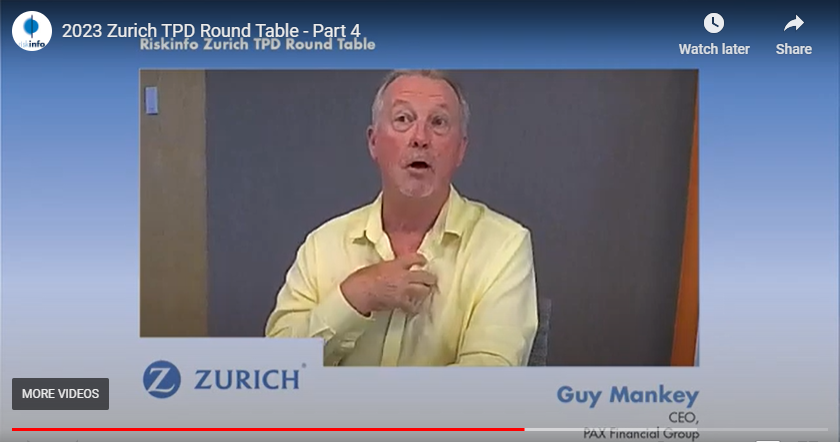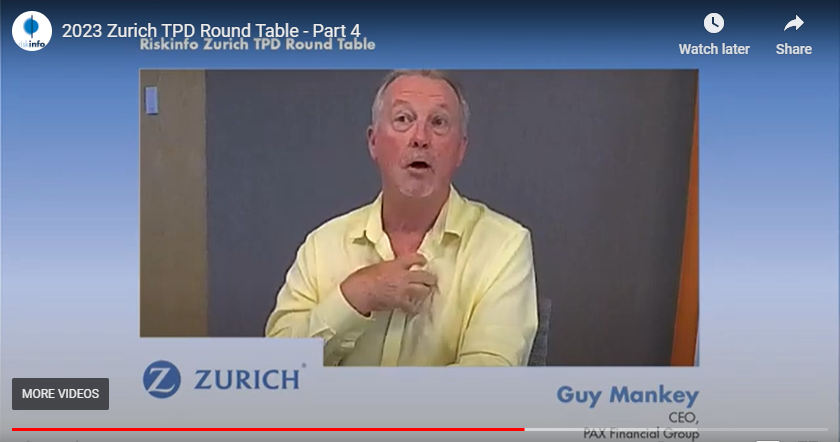Generating much reader interest this week was our report on advisers delivering a clear message to their industry peers about what works at the coal face when it comes to finding the right TPD solution for clients, especially during times of heightened cost of living pressures…
TPD products in the Australian market provide good coverage, but significant affordability challenges – especially in recent years – mean it is critical for there to be as much flexibility as possible for advisers to allow them to arrive at an acceptable solution for their client.
This is one of a number of key issues emanating from last month’s TPD Round Table, at which advisers delivered a clear message to their industry peers about what works at the coal face.
Flowing from a conversation about the challenges presented by the emergence of mental health-related TPD claims (see: ‘Normalisation’ of Mental Illness Causing TPD Conflict), the licensee and adviser voices on the TPD Round Table panel offered a very pragmatic view as to how the industry can better support their advice conversations with clients.
In looking at win/win outcomes, the message from advisers to industry was that more options and more flexibility in TPD product offers can make all the difference in finding the compromise needed to ensure the client can obtain the cover they need, based on their individual circumstances.
…graded TPD cover options …might engage better with clients in today’s environment
The example used in the conversation related in part to mental health exclusions, would see a range of solutions offered to clients that may include their ability to opt for a scaled-down cover proposition which may exclude, say, mental health-related and chronic fatigue conditions. The advisers suggested that such graded TPD cover options (eg full cover or cover against a reduced number of events or conditions), which may not normally resonate with prospective policy owners, might engage better with clients in today’s environment where affordability and the general cost of living is at such a heightened level of concern for the consumer.
According to risk specialist adviser and business owner, Guy Mankey, offering the client the ability to select from a range of solutions also reduces the chances of potential future litigation around the recommendation of a specific solution if such options were not available.
The ability, then, to offer a range of different TPD cover options at different price points serves to both broaden the scope for clients to find a workable solution for their circumstances while also allowing the adviser to seek a compromise direction from the client rather than only tabling and recommending a single solution.
Take this link or click the image below to listen to Part 4 of our TPD Round Table, which addresses these issues of affordability and flexibility around the TPD product offer.














This TPD debate is very interesting as illustrated by your TPD roundtable. I am still of the view that insurers appear to be unnecessarily paying TPD benefits for mental health conditions that are NOT permanent, nor total. Why is that so – is this some sort of post Hayne neurosis.
There is talk in this webinar about insurers paying TPD by instalments. About two decades ago One Path had an option for non-super death and TPD benefits to be paid by instalments, tax-free . The take-up on that option was less then 5%. One Path informed me that “holistic” advisers did not like the instalment concept , but there had been some take-up with risk-only advisers.
I might put a few noses out of joint here but I suspect the reasons behind that with an anomaly was that so-called holistic advisers could see a situation where there was no need for the beneficiary of a death or TPD lump sum payout to regularly consult their financial adviser on how the investment of the TPD that the lump sum was performing, with associated fees. Making a conflicted decision like that in today’s environment would be a breach of FASEA.
I found sophisticated clients liked the idea of predictable benefits paid by instalment and not at the whim of market returns. One medical professional said to me, in relation to his death benefit, that he did not like the idea of his wife and their four children having to trot off every six months or so to their investment adviser to ensure that their income from the death benefit continued on merrily. He liked the idea of a stress free income for his family.
The other elephant in the room with drip feed of TPD in super would be the lump sum tax issue. Would the ATO still insist the lump sum tax be paid up front before the instalments were calculated? Or could they suddenly determine that those regular payments were in fact income, and therefore assessable. Be careful what you wish for!
The discussions here also went back to the severity base trauma products, copied from South Africa, the home of trauma products, and first introduced in Australia by Macquarie. It never sold because neither advisers nor potential clients could see the benefit, particularly when it related to diagnosis of cancer. To be having an argument with the claims people as to what stage your cancer had reached, while you are contemplating spending a fortune on non-PBS pharmaceutical treatments, would just add more stress to an already stressed client with a possible terminal illness prognosis. From memory the Macquarie option, which I believe is still available from Zurich, did not offer any significant premium savings. But it was good for insurers apparently. And yes, NZ is another country!
I do think there may be a capacity for trauma contracts to be scaled back to the original core benefits as in the early days of product design – cancer, heart attack, heart surgery, stroke and paralysis. But advisers would be in the glare of the FASEA spotlight and AFCA artillery if an insurer offered two versions of trauma – one with core benefits only, and the other with core benefits plus extras, with the adviser explaining the options in numerous file notes. Hello Standard 5
Comments are closed.